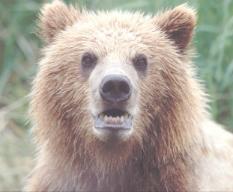 Laying down for a long winter’s sleep…sounds like a great way to deal with the holiday hustle and bustle. Actually hibernation is a method to deal with the lack of available food in the winter. Bears eat a diet of primarily plants, berries and insects, eating enough to gain 30 lbs. per week. In winter there is not enough food to be found to keep a bear going.
Laying down for a long winter’s sleep…sounds like a great way to deal with the holiday hustle and bustle. Actually hibernation is a method to deal with the lack of available food in the winter. Bears eat a diet of primarily plants, berries and insects, eating enough to gain 30 lbs. per week. In winter there is not enough food to be found to keep a bear going.Bears look for a place of safety while they are in this sleeping state from October to April. In fall they will scrape leaves and plant material into a cave, burrow, hollowed out tree or rock crevice as a nest. Sometimes they just make a nest on the surface of the ground. Bears curl into a ball to endure the cold of winter. Dens offer little or no insulating value, and are usually the same temperature as outside the den. The bears heavy winter coat and fat layer do all the insulating. The heavy, rounded shape of a bear provides a low surface area-to-mass ratio that is the key to retaining heat.
Using reserves of fat accumulated over the spring and summer, bears can go over 100 days without eating, drinking, urinating or defecating. Fat breaks down into water and 4000 calories per day. Muscle and organs break down to provide protein, yet they don’t loose any muscle mass. They are later able to rebuild those organs, unlike a starving human. Calcium is efficiently recycled so they experience no bone loss, as inactive people do. Their heart beat goes from 55 to 8 beats per minute. Body temperature drops by 12 degrees. Metabolism drops by half. They sleep deeply, but can wake occasionally although it takes some time; minutes to hours. Smaller hibernators, such as squirrels, bats and marmots wake much more frequently during hibernation than bears.
Grizzly bears have long claws and are known for their skill in digging. They prefer to dig their den into the north slope at high elevation so they get covered by the maximum amount of insulating snow. Black bears have much smaller claws and are not known for their digging skills. They prefer to find a suitable site that only requires remodeling.
Scientists are studying hibernation to aid in several human conditions. We’d like to understand their ability to maintain perfect water balance without drinking for 100 days, or how bears deal with toxic urea building up in the blood stream. There are many implications for patients suffering from kidney disease. Also, bears have double the cholesterol of humans but no hardening of their arteries. There also remains the possibility of inducing human hibernation for transporting wounded soldiers from battlefields, treating the severely burned or preserving organs by inducing hibernation in the organ itself. Obesity, osteoporosis, diabetes, kidney and gall bladder problems, muscle-wasting conditions are among the conditions bears could help us to understand. NASA is interested in the implications for long distance space travel.
Mmm, think I might go take a nap…
Submitted by Julie Hayes
